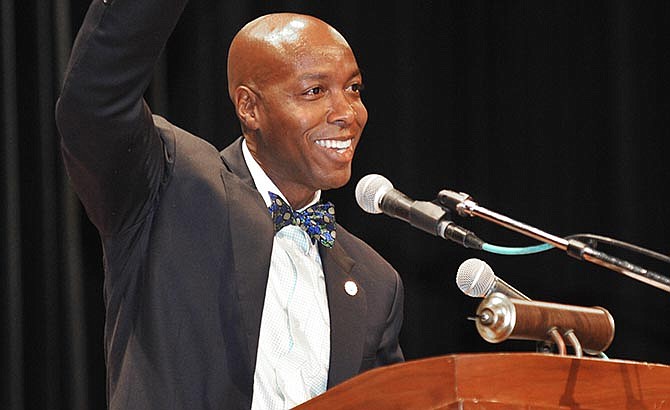While Lincoln University faculty and staff are being encouraged to welcome and embrace changes, supporters of LU's history degree program remain concerned over its July 18 deactivation.
President Kevin Rome reminded Thursday morning's session of the Faculty-Staff Fall Institute the history program wasn't terminated immediately. Deactivation means the program can make changes to revive itself and, if the president supports those changes, return to active status.
"I want to be very clear - what's driving us is the future," Rome said, "where we want to be situated and positioned in the future."
He noted there's a growing national push for performance funding and a college rating system.
The president and legislators "are saying nationally, 'What's the value of education? How can we quantify it?'" Rome explained. "If students get good jobs, then we have value.
"If students can't get jobs - or get jobs that pay off their student loans, that's what it really comes down to - then we're not doing a good job."
State officials want Lincoln and other higher education institutions to track graduates, including if they get jobs after college, how much they get paid and whether those jobs are in a field covered by their degrees, Rome said.
He noted state funding has dropped by 25 percent since 2009, but Missouri colleges and universities still are expected to do the same amount of work with the same amount of people.
Like most schools around the nation, Rome said Lincoln is looking at ways to cut underperforming or marginal programs in favor of classes that attract larger numbers of students and will help those students get jobs.
"They shouldn't graduate and have the same job they could have gotten without going to college," he said.
In his presentation, Rome showed a number of headlines from around the country, naming other colleges and universities around the country which have cut a number of academic programs, including 46 degree programs across the University of North Carolina system.
"This isn't something that's just happening at Lincoln University," Rome said. "It's happening all over the country, and if we think that we're immune to what's happening throughout the country, we're fooling ourselves.
"It's going to hit us. And I'd rather us take control and manage and make it happen, rather than someone else have to come in and do it for us."
He acknowledged many people don't want to hear those statistics, "but it's something that we have to think about!"
In his separate remarks from Rome's address, Curators Board President Marvin Teer also noted colleges around the country are being challenged financially.
"Cuts to Missouri's Higher Education system are making college less affordable and threatening the quality of classroom instruction," he said.
Teer, from St. Louis and an LU graduate, reminded the faculty and staff universities across Missouri eliminated 116 degree programs in 2011 as part of a cost-saving review - simply because few students pursue degrees in those areas.
"We as policy members are focused on making sound decisions about how to raise and use our resources and avoid or reverse short-sighted cuts which make it harder to invest in higher education," he added.
Related article: LU faculty, staff reminded change is inevitable

